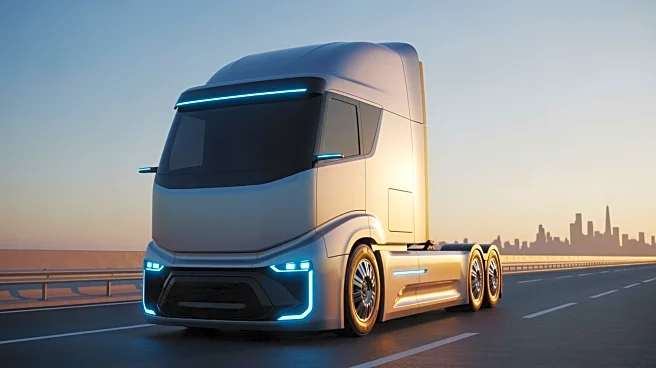What's Happening?
Japan is facing a significant shortage of drivers in the logistics industry, prompting the government and commercial vehicle manufacturers to expedite the development and testing of self-driving trucks. The goal is to achieve Level 4 autonomous driving,
which allows vehicles to operate without human intervention under specific conditions. Recent tests conducted in Hokkaido demonstrated the capabilities of these trucks, including autonomous lane changes, overtaking, and smooth acceleration and deceleration. Despite the promising technology, there is concern about public acceptance, as a single accident could lead to widespread rejection. Efforts are being made to ensure the autonomous driving level matches or exceeds that of a careful human driver.
Why It's Important?
The advancement of self-driving trucks in Japan could have significant implications for the logistics industry, potentially alleviating the driver shortage and increasing efficiency. If successful, this technology could reduce labor costs and improve delivery times, benefiting businesses and consumers alike. However, public acceptance remains a critical hurdle, as safety concerns could impede widespread adoption. The development of autonomous vehicles also raises questions about the future of employment in the logistics sector, as traditional driving jobs may be at risk. The outcome of these tests could influence global trends in autonomous vehicle technology and its integration into commercial operations.
What's Next?
Japan's government and vehicle manufacturers will continue to conduct tests and gather data to refine the technology and address safety concerns. Public outreach efforts will be crucial to gaining acceptance and easing fears about autonomous trucks. As the technology progresses, regulatory frameworks may need to be updated to accommodate self-driving vehicles on public roads. The success of these initiatives could pave the way for broader implementation of autonomous trucks, potentially influencing international standards and practices in the logistics industry.
Beyond the Headlines
The push for self-driving trucks in Japan highlights broader trends in automation and artificial intelligence across industries. As technology advances, ethical considerations regarding job displacement and safety must be addressed. The integration of autonomous vehicles could lead to shifts in urban planning and infrastructure, as roads and traffic systems adapt to accommodate new technologies. Additionally, the environmental impact of autonomous trucks, including potential reductions in emissions and fuel consumption, could contribute to sustainability goals.

















